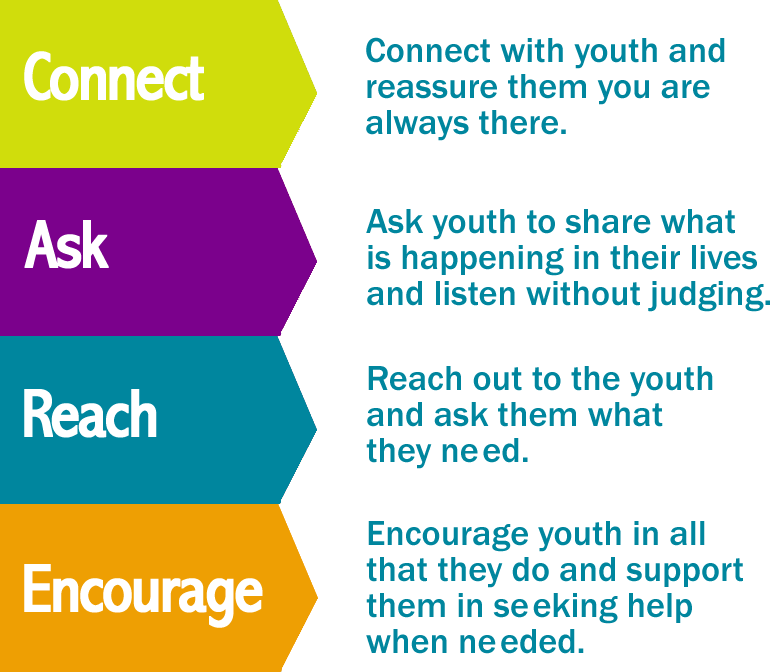Parents
As a parent, you are already a natural helper to your teen or young person. Even though your youth is gaining more independence and figuring out their path in the world, it can be hard to manage the many pressures and decisions they face. They need you, even though they might not say it or show it. The majority of youth identify that their parents or a close family member are the people they will turn to when they need help…but are you ready to talk about some serious stuff?
Where can you start?
We C.A.R.E is about promoting positive youth mental health. Here are a few steps you can take to help stay connected with teens/youth in your life:(Click on the letters below to learn more)

Is everything okay with your teen/youth?
It may be difficult for you to imagine that your child could be struggling with their mental health. Mental health problems are often overlooked because they are not always physically seen, and can be difficult to identify. As well, your child may find it difficult to ask for help because of the stigma attached to many mental health issues. By educating ourselves and others, we can help to reduce this stigma. Like any physical illness, mental illness is not the fault of the person struggling. It is important that they receive the support they need.
How can you tell if your child may be struggling with their mental health?
When mental health problems are left untreated, children and youth may cope in unhealthy ways. It is important to be alert to changes in your child. Here are some potential signs to watch for:
- Change in behaviours, friends, or regular activities
- Difficulty sleeping, or sleeping far too much
- Low energy and motivation
- Frequent outbursts of anger or rage
- Decrease in marks and school performance
- Avoidance of family or friends
- Signs of self-injury
- Use of alcohol or drugs
- Change in personality
- Constant worry or sadness
- Negative self-talk
- Change in physical health and/or hygiene
- Loss of appetite or overeating
- Has experienced a recent loss
What can you do if you notice a change in your child’s behaviour?
If you have noticed warning signs in your child, it is important to talk with them about what specific changes you have noticed. Try to remain caring, open and supportive.
Prepare Yourself
- Write down what you want to say
- Think about what you would do if your child had a negative reaction
- Find out about mental health resources in your community
- Talk to others who are in contact with your child regularly to see if they have noticed similar changes and behaviours
- Talk to other parents who may have dealt with similar situations
- Choose an appropriate time and place to have the conversation
- Find out about mental health resources in your community.
Spend Quality Time Together
It is important for you and your child to have regular opportunities to talk openly. 
Here are some ways to open up a conversation with your child:- Prepare and eat dinner together
- Take advantage of car rides to talk
- Send a text to your child to check in
- Offer to help your child with their homework
- Go for a walk together
- Play a game together
- Take interest in healthy hobbies and activities they are interested
- Choose a day of the week with your child to have regular one-on-one time together
How to help a youth deal with thoughts of suicide
- Talk to them: tell them you are concerned and you care.
- Ask them: "Have you thought about killing yourself?" It's ok to ask the question, and it doesn't make them more likely or give them the idea.
- Get support: talk to a counsellor, teacher, or friend that can help you; it's important to take care of yourself, too!
When the youth's actions or words are cause for concern, take the young person to the nearest hospital Emergency Department or call 911.
What are the danger signs?
In some cases those who die by suicide, do not give any warning at all. Many, however, offer clues and communicate their plans to others. Individuals expressing suicidal intentions should always be taken seriously. Some of the signs to look out for are:- direct suicide threats such as “I want to die,” or indirect threats such as “You would be better off without me”
- personality changes or withdrawn behaviour
- hoarding medication
- giving away prized possessions
- lack of interest in future plans
- isolation from friends and colleagues
- depression
Threats that may signal imminent danger often come from people who are isolated, who have attempted suicide before (and then were discovered only by accident), are impulsive, and have access to lethal means (weapons, drugs). (Adapted from Canadian Mental Health Association)
Do
- Stay calm
- Take it seriously
- Physically get at the youth's level, i.e., sitting
- Present as caring
- Explore thoughts and feelings
- Identify and prioritize immediate stressors
- Seek assistance
- Promise Privacy
Don't
- Panic!
- Ignore the person's need to talk
- Allow external disruptions
- Minimize the youth's distress
- Moralize about the young person's thoughts or feelings
- Be reluctant to draw on the expertise of others
- Leave the youth alone
- Promise confidentiality
Do you need to get help?


There are many services available for youth and their families in Grey and Bruce Counties.
